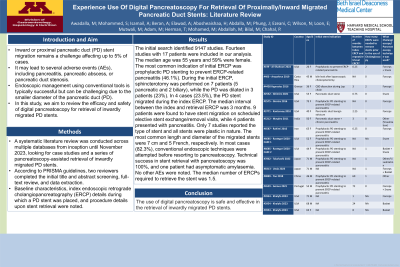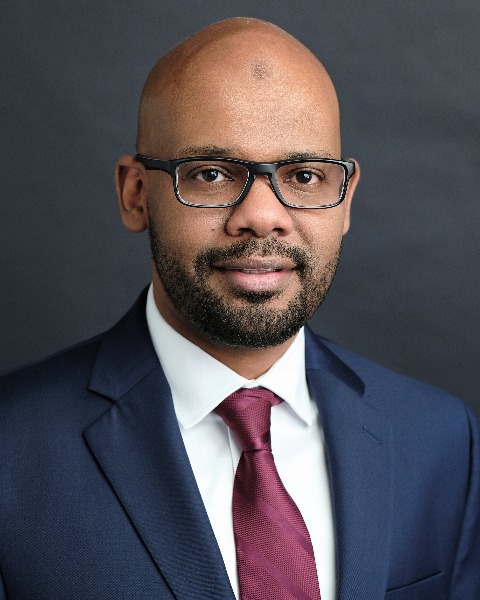Monday Poster Session
Category: Biliary/Pancreas
P1737 - Use Of Digital Pancreatoscopy For Retrieval Of Proximally/Inward Migrated Pancreatic Duct Stents: Literature Review
Monday, October 28, 2024
10:30 AM - 4:00 PM ET
Location: Exhibit Hall E

Has Audio

Mohanad Awadalla, MD
Beth Israel Deaconess Medical Center
Shrewsbury, MA
Presenting Author(s)
Mohanad Awadalla, MD1, Shaikhoon S. Mohammed, MD2, Abdellatif Ismail, MD3, Azizullah Beran, MD4, Ayman Elawad, MD5, Hazem Abosheaishaa, MD6, Monzer Abdalla, MD7, Jenson Phung, MD8, Chukwunonso Ezeani, MBBS9, Natalie Wilson, MD8, Erica Loon, DO8, Maali Mutwali, MD10, Mohammad Adam, MD, MSc11, Tessa Herman, MD12, Mouhand F.H. Mohamed, MD, MSc13, Mohamed Abdallah, MD14, Mohammad Bilal, MD12, Prabhleen Chahal, MD15
1Beth Israel Deaconess Medical Center, Boston, MA; 2Emory Clinic/Emory Healthcare, Atlanta, GA; 3University of Maryland Medical Center, Baltimore, MD; 4Indiana University School of Medicine, Indianapolis, IN; 5Massachusetts General Hospital, Boston, MA; 6Icahn School of Medicine at Mount Sinai, Queens, NY; 7Ascension Saint Francis Hospital, Evanston, IL; 8University of Minnesota, Minneapolis, MN; 9Baton Rouge General Medical Center, Baton Rouge, LA; 10Michigan State University, Shrewsbury, MA; 11University of Missouri - Kansas City School of Medicine, Kansas City, MO; 12University of Minnesota and Minneapolis VA Health Care System, Minneapolis, MN; 13Mayo Clinic, Rochester, MN; 14Cleveland Clinic, Cleveland, OH; 15Cleveland Clinic Foundation, Cleveland, OH
Introduction: Inward or proximal pancreatic duct (PD) stent migration remains a challenge affecting up to 5% of cases. It may lead to several adverse events (AEs), including pancreatitis, pancreatic abscess, or pancreatic duct stenosis. Endoscopic management using conventional tools is typically successful but can be challenging due to the smaller diameter of the pancreatic duct (PD). In this study, we aim to review the efficacy and safety of digital pancreatoscopy for retrieval of inwardly migrated PD stents.
Methods: A systematic literature review was conducted across multiple databases from inception until November 2023, looking for case studies and a series of pancreatoscopy-assisted retrieval of inwardly migrated PD stents. According to PRISMA guidelines, two reviewers completed the initial title and abstract screening, full-text review, and data extraction. Baseline characteristics, index endoscopic retrograde cholangiopancreatography (ERCP) details during which a PD stent was placed, and procedure details upon stent retrieval were noted.
Results: The initial search identified 9147 studies. Fourteen studies with 17 patients were included in our analysis. The median age was 55 years and 59% were female. The most common indication of initial ERCP was prophylactic PD stenting to prevent ERCP-related pancreatitis (46.1%). During the initial ERCP, sphincterotomy was performed on 7 patients (5 pancreatic and 2 biliary), while the PD was dilated in 3 patients (23%). 13 patients had one stent placed. In 4 cases (23.5%), the PD stent migrated during the index ERCP. The median interval between the index and retrieval ERCP was 3 months. 9 patients were found to have stent migration on scheduled elective stent exchange/removal visits, while 4 patients presented with pancreatitis. Only 7 studies reported the type of stent and all stents were plastic in nature. The most common length and diameter of the migrated stents were 7 cm and 5 French, respectively. In most cases (82.3%), conventional endoscopic techniques were attempted before resorting to pancreatoscopy. Technical success in stent retrieval with pancreatoscopy was 100%, and one patient had asymptomatic amylasemia. No other AEs were noted. The median number of ERCPs required to retrieve the stent was 1.5.
Discussion: The use of digital pancreatoscopy is safe and effective in the retrieval of inwardly migrated PD stents.
Note: The table for this abstract can be viewed in the ePoster Gallery section of the ACG 2024 ePoster Site or in The American Journal of Gastroenterology's abstract supplement issue, both of which will be available starting October 27, 2024.
Disclosures:
Mohanad Awadalla, MD1, Shaikhoon S. Mohammed, MD2, Abdellatif Ismail, MD3, Azizullah Beran, MD4, Ayman Elawad, MD5, Hazem Abosheaishaa, MD6, Monzer Abdalla, MD7, Jenson Phung, MD8, Chukwunonso Ezeani, MBBS9, Natalie Wilson, MD8, Erica Loon, DO8, Maali Mutwali, MD10, Mohammad Adam, MD, MSc11, Tessa Herman, MD12, Mouhand F.H. Mohamed, MD, MSc13, Mohamed Abdallah, MD14, Mohammad Bilal, MD12, Prabhleen Chahal, MD15. P1737 - Use Of Digital Pancreatoscopy For Retrieval Of Proximally/Inward Migrated Pancreatic Duct Stents: Literature Review, ACG 2024 Annual Scientific Meeting Abstracts. Philadelphia, PA: American College of Gastroenterology.
1Beth Israel Deaconess Medical Center, Boston, MA; 2Emory Clinic/Emory Healthcare, Atlanta, GA; 3University of Maryland Medical Center, Baltimore, MD; 4Indiana University School of Medicine, Indianapolis, IN; 5Massachusetts General Hospital, Boston, MA; 6Icahn School of Medicine at Mount Sinai, Queens, NY; 7Ascension Saint Francis Hospital, Evanston, IL; 8University of Minnesota, Minneapolis, MN; 9Baton Rouge General Medical Center, Baton Rouge, LA; 10Michigan State University, Shrewsbury, MA; 11University of Missouri - Kansas City School of Medicine, Kansas City, MO; 12University of Minnesota and Minneapolis VA Health Care System, Minneapolis, MN; 13Mayo Clinic, Rochester, MN; 14Cleveland Clinic, Cleveland, OH; 15Cleveland Clinic Foundation, Cleveland, OH
Introduction: Inward or proximal pancreatic duct (PD) stent migration remains a challenge affecting up to 5% of cases. It may lead to several adverse events (AEs), including pancreatitis, pancreatic abscess, or pancreatic duct stenosis. Endoscopic management using conventional tools is typically successful but can be challenging due to the smaller diameter of the pancreatic duct (PD). In this study, we aim to review the efficacy and safety of digital pancreatoscopy for retrieval of inwardly migrated PD stents.
Methods: A systematic literature review was conducted across multiple databases from inception until November 2023, looking for case studies and a series of pancreatoscopy-assisted retrieval of inwardly migrated PD stents. According to PRISMA guidelines, two reviewers completed the initial title and abstract screening, full-text review, and data extraction. Baseline characteristics, index endoscopic retrograde cholangiopancreatography (ERCP) details during which a PD stent was placed, and procedure details upon stent retrieval were noted.
Results: The initial search identified 9147 studies. Fourteen studies with 17 patients were included in our analysis. The median age was 55 years and 59% were female. The most common indication of initial ERCP was prophylactic PD stenting to prevent ERCP-related pancreatitis (46.1%). During the initial ERCP, sphincterotomy was performed on 7 patients (5 pancreatic and 2 biliary), while the PD was dilated in 3 patients (23%). 13 patients had one stent placed. In 4 cases (23.5%), the PD stent migrated during the index ERCP. The median interval between the index and retrieval ERCP was 3 months. 9 patients were found to have stent migration on scheduled elective stent exchange/removal visits, while 4 patients presented with pancreatitis. Only 7 studies reported the type of stent and all stents were plastic in nature. The most common length and diameter of the migrated stents were 7 cm and 5 French, respectively. In most cases (82.3%), conventional endoscopic techniques were attempted before resorting to pancreatoscopy. Technical success in stent retrieval with pancreatoscopy was 100%, and one patient had asymptomatic amylasemia. No other AEs were noted. The median number of ERCPs required to retrieve the stent was 1.5.
Discussion: The use of digital pancreatoscopy is safe and effective in the retrieval of inwardly migrated PD stents.
Note: The table for this abstract can be viewed in the ePoster Gallery section of the ACG 2024 ePoster Site or in The American Journal of Gastroenterology's abstract supplement issue, both of which will be available starting October 27, 2024.
Disclosures:
Mohanad Awadalla indicated no relevant financial relationships.
Shaikhoon Mohammed indicated no relevant financial relationships.
Abdellatif Ismail indicated no relevant financial relationships.
Azizullah Beran indicated no relevant financial relationships.
Ayman Elawad indicated no relevant financial relationships.
Hazem Abosheaishaa indicated no relevant financial relationships.
Monzer Abdalla indicated no relevant financial relationships.
Jenson Phung indicated no relevant financial relationships.
Chukwunonso Ezeani indicated no relevant financial relationships.
Natalie Wilson indicated no relevant financial relationships.
Erica Loon indicated no relevant financial relationships.
Maali Mutwali indicated no relevant financial relationships.
Mohammad Adam indicated no relevant financial relationships.
Tessa Herman indicated no relevant financial relationships.
Mouhand Mohamed indicated no relevant financial relationships.
Mohamed Abdallah indicated no relevant financial relationships.
Mohammad Bilal: Boston Scientific – Consultant. Cook endoscopy – Speakers Bureau.
Prabhleen Chahal: Boston Scientific – Advisor or Review Panel Member.
Mohanad Awadalla, MD1, Shaikhoon S. Mohammed, MD2, Abdellatif Ismail, MD3, Azizullah Beran, MD4, Ayman Elawad, MD5, Hazem Abosheaishaa, MD6, Monzer Abdalla, MD7, Jenson Phung, MD8, Chukwunonso Ezeani, MBBS9, Natalie Wilson, MD8, Erica Loon, DO8, Maali Mutwali, MD10, Mohammad Adam, MD, MSc11, Tessa Herman, MD12, Mouhand F.H. Mohamed, MD, MSc13, Mohamed Abdallah, MD14, Mohammad Bilal, MD12, Prabhleen Chahal, MD15. P1737 - Use Of Digital Pancreatoscopy For Retrieval Of Proximally/Inward Migrated Pancreatic Duct Stents: Literature Review, ACG 2024 Annual Scientific Meeting Abstracts. Philadelphia, PA: American College of Gastroenterology.
